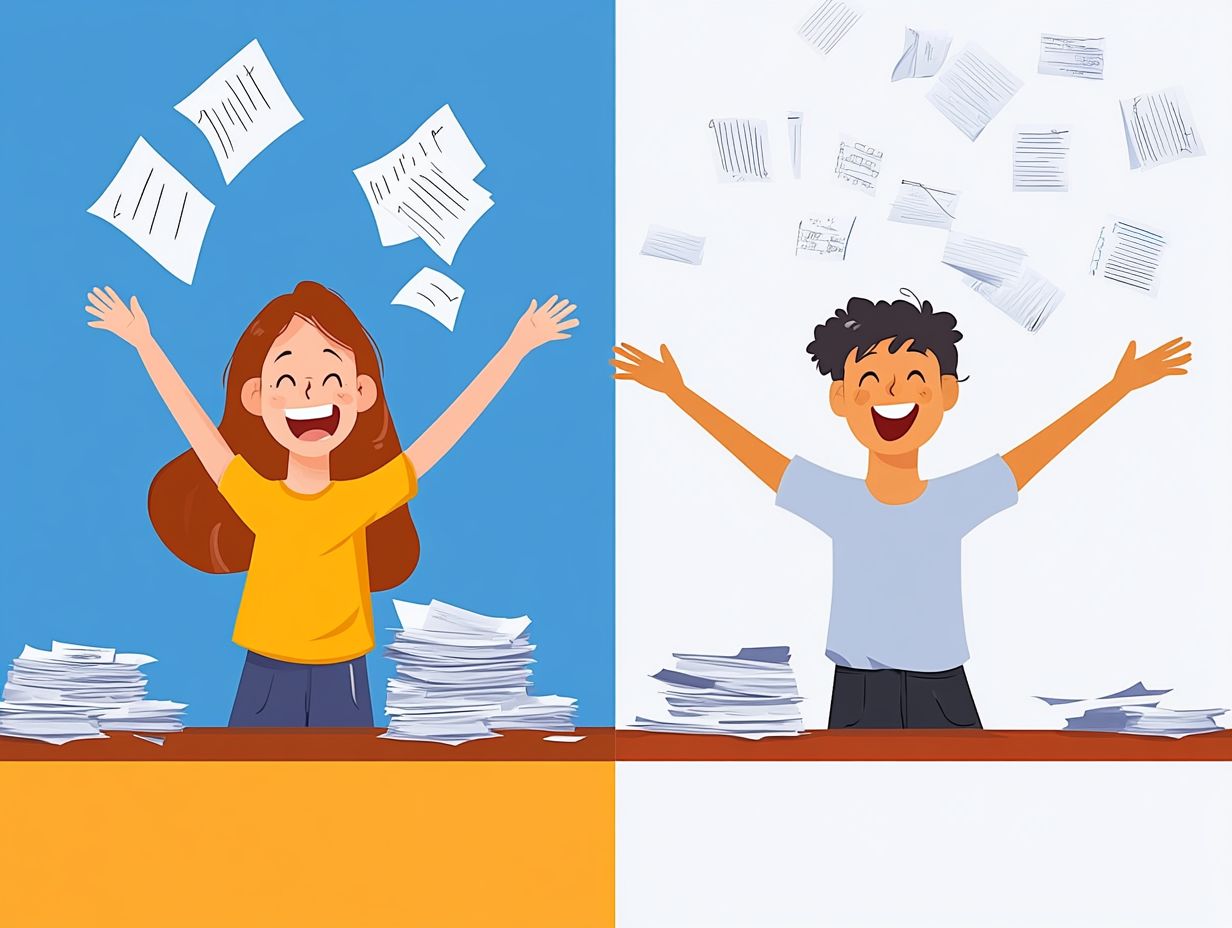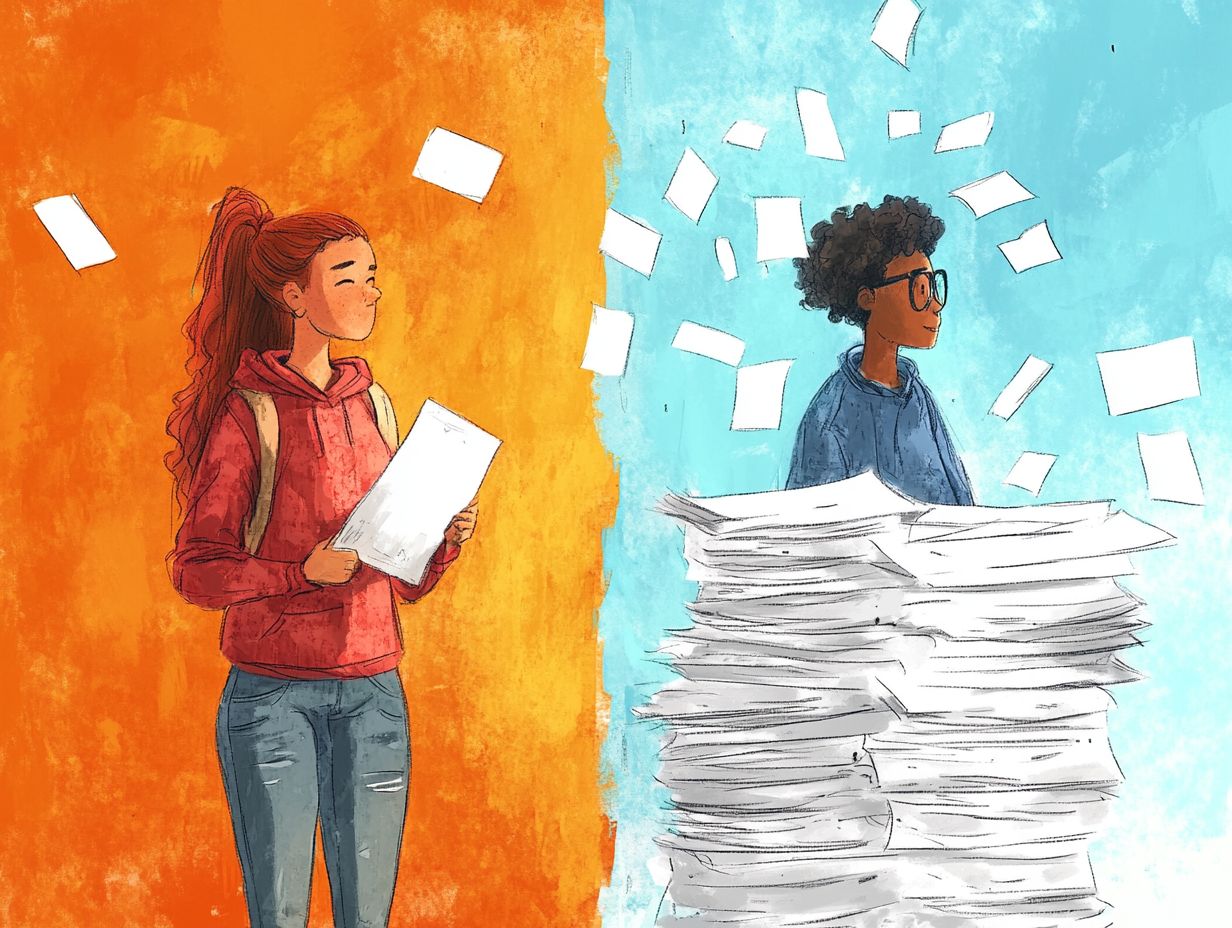the pros and cons of standardized testing
Standardized testing has been a foundational element of educational assessment, igniting discussions among educators, parents, and policymakers alike. Join us as we dive into the exciting world of standardized testing!
On one hand, supporters contend that these tests offer valuable insights into student performance and can catalyze school improvement. On the other hand, critics point out their limitations in truly measuring learning and the potential adverse effects on teaching methods.
This article explores the benefits and drawbacks of standardized testing while also examining alternative assessment methods that are gaining traction in some schools. Don t miss out on understanding this critical aspect of education!
Contents
Key Takeaways:

Standardized testing provides a way to measure student performance and provide data for school improvement. However, it can be limited in accurately measuring student learning and may have negative effects on teaching and learning. Alternative assessment methods and schools without standardized testing offer potential solutions to the drawbacks of standardized testing.
What is Standardized Testing?
Standardized testing serves as a vital assessment tool within the U.S. education system. It allows educators to evaluate student performance and educational outcomes across various groups of students.
Often mandated by educational policies like the No Child Left Behind Act a law aimed at improving student achievement these tests provide an objective measurement of students’ knowledge, skills, and abilities at specific grade levels.
By establishing educational standards, standardized tests promote accountability. They help identify areas where teaching quality and student assessment can improve.
Historically, standardized testing has evolved significantly from early assessments focused on educational placement to a comprehensive system that influences curriculum development and resource allocation. Its purpose goes beyond mere evaluation; these tests act as benchmarks for educational equity, illuminating disparities in achievement among different student populations.
As educators analyze test results, they often adjust their teaching methods to better address the diverse needs of learners. However, the reliance on standardized testing has ignited ongoing debates about fairness, motivation, and its overall impact on students’ educational experiences.
This has prompted critical discussions on how to strike the right balance between assessment and meaningful learning.
Benefits of Standardized Testing
Standardized testing presents several advantages that significantly enhance the education system. It offers valuable insights into student performance and teaching quality, ultimately contributing to a more effective learning environment.
Evaluating Student Performance
Evaluating student performance through standardized assessments provides educators with a comprehensive view of academic abilities and overall educational outcomes.
These evaluations come in various formats, from multiple-choice questions that gauge knowledge retention to essays that foster critical thinking and the articulation of ideas. Each type of assessment is essential for educators to dissect individual strengths and weaknesses, ultimately influencing grading practices and instructional strategies.
The results inform teachers about areas of excellence or struggle. They carry significant implications for curriculum development and educational policy. This structured approach enriches understanding of how effectively learning objectives are being met across diverse student groups.
Providing Data for School Improvement

Standardized testing provides critical data that schools can utilize to pinpoint areas needing improvement. This fosters a culture of accountability and continuous growth.
By analyzing this data, educators gain valuable insights into student performance trends, enabling targeted interventions designed to bridge learning gaps.
These assessments often reveal the effectiveness of various teaching strategies, allowing educators to refine instructional approaches based on real-world outcomes. When data-driven methods are strategically implemented, they enhance educational frameworks.
This ensures that the curriculum remains relevant and impactful while preparing students for future challenges. Leveraging insights from these evaluations cultivates a dynamic learning environment where both educators and students can truly thrive.
Drawbacks of Standardized Testing
While standardized testing offers certain benefits, it also brings forth several drawbacks that can hinder student learning and compromise educational equity in both public and private schools.
Limitations in Measuring Student Learning
One main limitation of standardized testing is its inability to thoroughly measure learning across diverse knowledge areas and various learning styles. This assessment approach often relies on a narrow set of criteria that doesn t account for the different ways in which students may excel.
Many students possess unique cognitive skills that simply don t shine within the confines of a rigid test format. For instance, standardized tests tend to emphasize rote memorization or multiple-choice questions, often neglecting critical thinking, creativity, and collaborative problem-solving abilities.
This leads to educators questioning the validity of test scores as a true representation of students’ capabilities and potential.
Negative Effects on Teaching and Learning
The emphasis on standardized testing can have detrimental effects on both teaching and learning, often constraining educational policies and methods. This pressure can lead educators to narrow their focus primarily on preparing students for exams rather than nurturing a more comprehensive understanding of the subject matter.
As a result, curriculum assessment tends to prioritize test-related outcomes, sometimes at the expense of essential skills like critical thinking, creativity, and interest in learning.
With accountability tied to these exams, educators may feel trapped in a cycle of ‘teaching to the test’ instead of fostering a rich and engaging learning environment.
This shift can diminish students’ love for learning, stifling their natural curiosity and ability to explore new ideas freely. A heavy reliance on testing can stifle innovation in teaching practices, ultimately hindering the holistic development of students.
Alternatives to Standardized Testing

Given the limitations inherent in standardized testing, many educators and institutions actively seek alternative assessment methods.
These approaches aim to provide a more nuanced evaluation of student learning and promote educational equity.
Other Assessment Methods
Alternative assessment methods, such as formative assessments and project-based learning, offer richer insights into student motivation and knowledge measurement.
These innovative approaches enable educators to gauge a student s understanding in real time, fostering a more interactive and supportive learning environment.
By moving away from an exclusive reliance on standardized tests which can often narrow focus and induce stress educators encourage collaboration and creativity.
For example, project-based learning allows students to apply their knowledge in real-world scenarios while cultivating their critical thinking skills.
Formative assessments, like quizzes or observations, provide immediate feedback, helping learners identify areas for improvement while keeping them engaged.
Together, these alternative assessments create a more comprehensive view of student performance, ultimately enhancing both engagement and comprehension.
Examples of Schools Without Standardized Testing
Some innovative schools have opted to abandon standardized testing in favor of alternative assessment methods that more accurately reflect educational outcomes.
For instance, the High Tech High network in California prioritizes project-based learning, evaluating students through real-world projects that highlight critical thinking and problem-solving skills.
Similarly, the Montessori School of Denver employs observation-based assessments, enabling educators to gauge student progress more holistically.
These methods nurture creativity while enhancing student engagement and understanding. Many educators have observed that this approach can lead to higher retention rates and greater student satisfaction, proving that alternative assessment can create enriching educational experiences.
Frequently Asked Questions
Consider reflecting on your experiences with standardized testing and explore the benefits of alternative assessment methods.
Why do standardized tests matter?

Standardized testing helps measure student achievement and progress. It also identifies areas for improvement and holds schools accountable for providing a high-quality education.
What are the drawbacks of standardized testing?
Some argue that these important tests that have significant consequences put too much emphasis on test scores. This focus can lead to a narrow curriculum.
High-stakes testing can cause stress and anxiety for students. Additionally, it may not accurately reflect a student’s true abilities or potential.
Do standardized tests accurately measure student learning?
Many people are curious about whether standardized tests really show what students can do! While they provide a snapshot of a student’s performance, they may not capture the full scope of their learning.
Students may not perform well under test-taking conditions, or the test may not align with their learning style.
How do standardized tests affect teachers?
Teachers often feel pressure to teach to the test. They may be evaluated based on their students’ test scores.
This can lead to a narrow curriculum and less time for creative and critical thinking activities.
Are there alternatives to standardized testing?
Yes, some schools and districts have implemented tests based on real-life tasks. These tests focus on real-world tasks and show how well students understand the material.
Portfolios and project-based assessments also provide a more comprehensive view of a student’s abilities.
What are the potential long-term consequences of standardized testing?
The emphasis on standardized testing may lead to a lack of focus on important skills such as creativity, problem-solving, and collaboration.
It may also contribute to a culture of competition rather than collaboration among students and schools.






